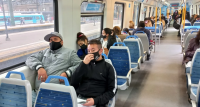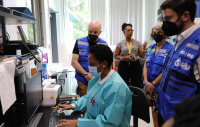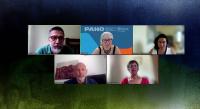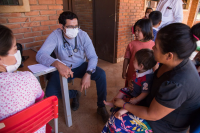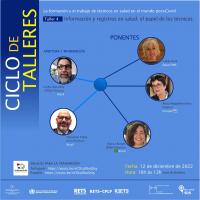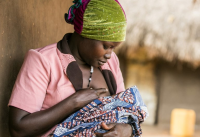You are here
News
-
02/14/2023 - The pandemic is no longer an emergency for most countries. America has been one of the hardest hit regions and despite being home to only 8% of the world's population, it had 28.5% of the positive cases and 42.6% of the total global mortality.
-
01/30/2023 - The WHO Director-General has the pleasure of transmitting the Report of the fourteenth meeting of the International Health Regulations (2005) (IHR) Emergency Committee regarding the coronavirus 2019 disease (COVID-19) pandemic, held on Friday 27 January 2023, from 14:00 to 17:00 CET.
-
01/24/2023 - "One of the most important lessons from the response to the COVID-19 pandemic is that innovative health interventions can be delivered fast if they are prioritized politically and financed adequately”, said Dr Tedros Adhanom Ghebreyesus. “The challenges presented by TB and COVID-19 are different, but the ingredients that accelerate science, research and innovation are the same: urgent, up-front public investment; support from philanthropy; and engagement of the private sector and communities. We believe the TB field will benefit from similar high-level coordination.”
-
01/17/2023 - The Pan American Health Organization (PAHO) has developed a digital platform to bring telehealth services to remote populations in Latin American and Caribbean countries, making telemedicine the “new normal” for healthcare workers and patients managing chronic diseases. Based on Open-Source technology, PAHO’s All-in-ONE Telehealth platform was developed in 2022 thanks to the financial contribution from the United States Government and has initially been piloted in Trinidad and Tobago.
-
12/22/2022 - More girls could be getting the human papillomavirus (HPV) vaccine, which protects against cervical cancer, following updated recommendations announced on Wednesday by the World Health Organization (WHO).
-
12/16/2022 - The initiative is part of a cycle of workshops and is carried out with the cooperation of the International Network for the Education of Health Technicians (RETS) and its sub-networks, and with the support of the Pan-American Health Organization, Fiocruz's Center for International Relations, and VideoSaúde
-
12/15/2022 - The Pan American Health Organization (PAHO) Director, Dr Carissa F. Etienne, has called on countries to redouble efforts towards achieving universal health as they begin to rebuild from the COVID-19 pandemic. “This region urgently needs to act to reverse the socioeconomic and health losses caused by the COVID-19 pandemic, address the growing burden of foregone care and recover lost public health gains”.
-
12/05/2022 - The fourth event of the Workshop Cycle "The training and work of health technicians in the post-Covid world" will be held on December 12 (Monday), from 10 am to 12 pm, and will focus on the role of technicians in the generation and use of health information and records that make up the health information systems of their countries. Mediated by Sebastián Tobar, advisor of the Center for International Relations in Health (Cris) at Fiocruz, and Carlos Eduardo Batistella, coordinator of International Cooperation at the Joaquim Venãncio Polytechnic School of Health (EPSJV/Fiocruz), the workshop will bring together Isabel Duré, Consultant in Policies and Management of Human Resources for Health at PAHO/WHO; Alicia Madalena Ferreira Mais, from the School of Economic Sciences and Administration of the University of the Republic (FCEA/Udelar - Uruguay); and Bianca Borges Leandro, professor, and researcher from EPSJV. Participate, learn more about the topic and contribute to the enrichment of the debate!
-
12/02/2022 - WHO is convening over 300 scientists who will consider the evidence on over 25 virus families and bacteria, as well as “Disease X”, which indicates an unknown pathogen that could cause a serious international epidemic. The process began on Friday and will guide global investment, and research and development (R&D), especially in vaccines, tests, and treatments.
-
11/17/2022 - WHO launched new guidelines to improve survival and health outcomes for babies born early (before 37 weeks of pregnancy) or small (under 2.5kg at birth). The guidelines advise that skin to skin contact with a caregiver – known as kangaroo mother care – should start immediately after birth, without any initial period in an incubator. This marks a significant change from earlier guidance and common clinical practice, reflecting the immense health benefits of ensuring caregivers and their preterm babies can stay close, without being separated, after birth.

